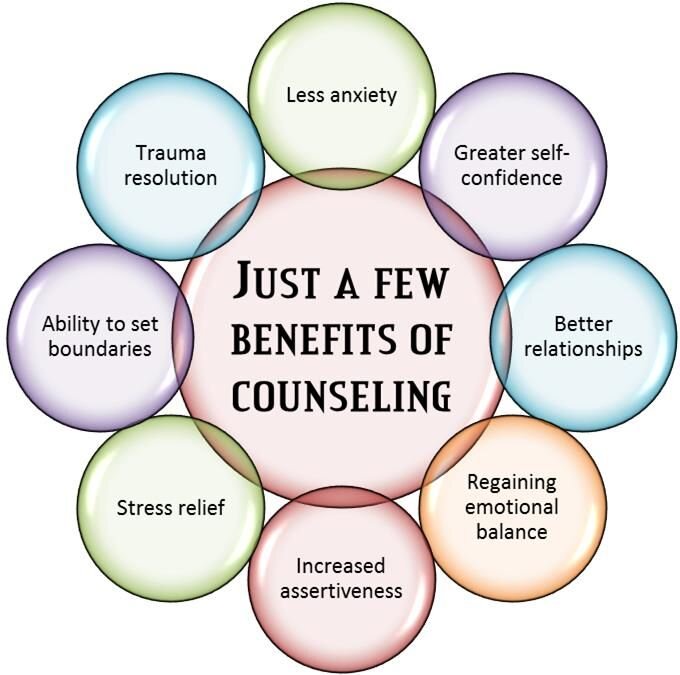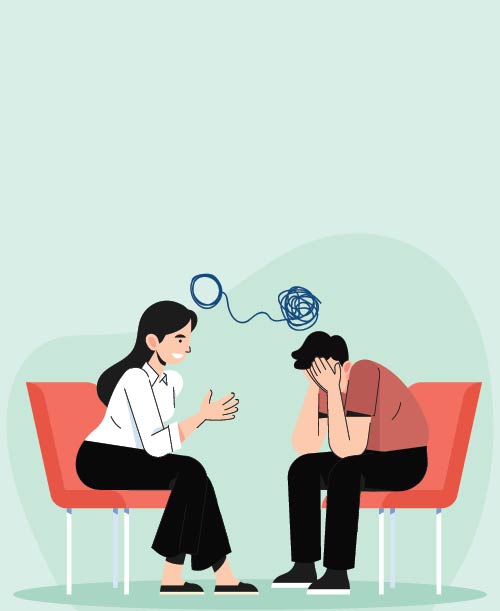Cognitive Behavioural Therapy and Couples Therapy: Can You Do Both at Once?
The Significance of Mental Wellness: a Deep Study Therapy, Treatment, and Their Benefits
Mental health greatly forms private well-being, affecting ideas, behaviors, and feelings. Counseling and treatment act as necessary methods for healing and personal growth. They offer organized assistance, assisting people navigate life's obstacles. Lots of remain unaware of the details kinds of therapy readily available and their distinct benefits. Understanding these facets is essential for any person taking into consideration expert mental wellness assistance. What complies with might brighten paths to strength and fulfillment that lots of overlook.
Understanding Mental Health And Wellness and Its Influence
Psychological health and wellness is typically ignored, it plays an essential role in total health and day-to-day performance - Cognitive Behavioural Therapy. It includes emotional, psychological, and social elements that affect just how people believe, feel, and act. A person's psychological wellness directly affects their ability to take care of stress and anxiety, connect to others, and choose. Poor psychological health can result in numerous issues, including anxiousness, depression, and problem in keeping relationships, all of which can prevent individual and professional growth.Furthermore, psychological wellness has far-reaching effects for physical health. Persistent stress and untreated psychological conditions can add to numerous physical ailments, such as heart problem and deteriorated immune responses. Alternatively, positive psychological health cultivates strength, making it possible for individuals to deal with life's obstacles effectively. Recognizing mental health's value is vital for fostering encouraging environments that advertise psychological wellness, therefore improving the top quality of life for people and communities alike
The Different Sorts Of Counseling and Therapy
In the domain of mental health and wellness, numerous therapy and therapy types cater to varied demands. Individual therapy strategies concentrate on personal concerns via individually sessions, while group therapy dynamics foster shared experiences and support amongst individuals. Understanding these methods is crucial for picking the appropriate treatment for different obstacles.
Specific Therapy Approaches
Many individual therapy methods exist, each designed to address specific mental health problems and deal with differing client needs. Cognitive Behavior Therapy (CBT) focuses on identifying and changing adverse idea patterns, while Psychodynamic Therapy explores unconscious processes and previous experiences. Humanistic Therapy highlights individual development and self-actualization, cultivating an encouraging atmosphere. Interpersonal Treatment (IPT) targets relationship problems and interaction patterns to boost psychological well-being. Additionally, Approval and Commitment Therapy (ACT) motivates clients to approve their thoughts and sensations while dedicating to personal worths. Each method supplies special techniques and viewpoints, enabling practitioners to tailor their methods to the person, thereby boosting the healing experience and advertising mental health and wellness recovery.
Team Treatment Dynamics
Team treatment dynamics incorporate different restorative strategies that leverage the power of interpersonal connections and common experiences. This form of therapy commonly consists of diverse groups, cultivating a secure atmosphere for individuals to express sensations and ideas. Key kinds of team therapy consist of assistance teams, which provide psychological assistance; process-oriented teams, focusing on interpersonal interactions; and psychoeducational groups, focused on passing on knowledge concerning psychological health and wellness issues. The dynamics within these teams can enhance self-awareness, as members commonly reflect on their habits in relation to others. Furthermore, group treatment fosters a feeling of belonging, lowering feelings of isolation. Via shared stories and cumulative analytic, participants can develop coping methods and obtain insights, inevitably adding to specific growth and recovery.
The Duty of Therapy in Mental Health
Counseling plays a vital function in mental health and wellness by supplying numerous approaches tailored to individual needs. These techniques provide expert support that can result in significant enhancements in psychological wellness. Recognizing the different types of therapy can assist individuals make educated choices about their psychological healthcare.

Sorts Of Therapy Methods
While various therapy strategies exist, each deals one-of-a-kind methods and insights right into psychological wellness therapy - Mental Health Resources. Among the most popular are cognitive-behavioral therapy (CBT), which focuses on modifying negative thought patterns; psychodynamic therapy, which discovers unconscious procedures and childhood years experiences; and humanistic approaches, stressing personal growth and self-actualization. Additionally, solution-focused quick treatment prioritizes finding solutions in the here and now as opposed to diving into troubles. Team treatment cultivates area and shared experiences, while family treatment addresses relational characteristics within familial frameworks. Each technique deals with various needs, aligning with private choices, problems, and restorative objectives. Recognizing these techniques helps clients make educated selections about their psychological health and wellness trip and advertises effective treatment customized to their special conditions
Benefits of Professional Advice
Various individuals take advantage of professional guidance in handling their psychological health and wellness difficulties. Therapy uses a safe space for clients to discover their thoughts and sensations without judgment. This therapeutic atmosphere cultivates self-awareness, allowing individuals to determine patterns in their behavior and establish healthier coping techniques. Professional support also gives accessibility to evidence-based methods that can reduce signs and symptoms of anxiety, depression, and other psychological health and wellness problems. Furthermore, therapists can help in establishing reasonable goals and use assistance in attaining them, enhancing overall wellness. The collective relationship in between counselor and client is essential, as it advertises responsibility and motivates individual development. Eventually, expert advice plays an essential duty in steering psychological health journeys, causing enhanced emotional strength and life complete see this website satisfaction.
Advantages of Therapy: Recovery and Development

How to Select the Right Specialist or Counselor
How can one navigate the commonly frustrating process of choosing the best therapist or therapist? Recognizing personal needs is crucial; individuals should consider their details problems, whether clinical depression, stress and anxiety, or connection obstacles. It is helpful to research study different therapeutic strategies, such as cognitive-behavioral treatment or psychodynamic treatment, to find a suitable match.Next, potential clients must look for references from relied on sources or make use of on the internet directory sites. It is crucial to evaluate therapists' qualifications, including their education and learning, licensing, and locations of expertise. Scheduling first assessments can aid assess compatibility, enabling people to evaluate interaction designs and individual comfort.Finally, logistical elements, such as area, schedule, and fees, must additionally be thought about. By thoughtfully weighing these aspects, one can make a notified decision, eventually promoting a therapeutic partnership that supports psychological wellness and personal development.
Getting Over Stigma: Embracing Mental Health And Wellness Support
While social attitudes toward mental health have evolved, stigma still provides a significant barrier for many looking for support. This stigma often manifests as misunderstandings bordering mental disease, leading individuals to really feel pity or anxiety concerning their struggles. Many individuals hesitate to go after counseling or treatment because of stress over being judged or identified. Conquering this stigma is fundamental for fostering a helpful setting where individuals can openly review their mental wellness needs.Communities and companies play a vital duty in this improvement by advertising awareness and education about mental health and wellness problems. Efforts that highlight individual tales can humanize these experiences, urging others to seek aid without concern. As approval expands, individuals may feel a lot more equipped to welcome mental health assistance, recognizing it as a vital element of overall health. By taking down preconception, culture can cultivate a society of understanding, concern, and aggressive mental healthcare.
Strategies for Preserving Mental Well-Being Beyond Therapy
Although therapy supplies useful support, keeping psychological health beyond sessions is just as vital. People can execute numerous methods to maintain their psychological health and wellness. Routine physical task plays an essential try this website function, as workout promotes the release of endorphins, which enhance mood. Additionally, a balanced diet regimen abundant in nutrients can significantly affect psychological stability and energy levels.Practicing mindfulness and meditation aids individuals handle tension and develop higher self-awareness. Developing a consistent rest routine is additionally essential, as top quality remainder is vital for cognitive function and psychological regulation.Engaging in social tasks fosters connection and decreases feelings of isolation. Pursuing hobbies or interests can offer a creative outlet and increase self-esteem. Establishing sensible goals and exercising self-compassion enables individuals to cultivate resilience. By integrating these approaches into life, individuals can efficiently sustain their psychological well-being beyond therapy sessions.
Regularly Asked Inquiries

How Can I Inform if I Required Treatment?

Establishing the demand for therapy usually entails identifying consistent sensations of unhappiness, anxiety, or frustrating stress and anxiety. If daily operating becomes challenging or coping systems fail, seeking professional assistance may be a useful progression.
What Should I Anticipate in My Initial Therapy Session?
In the first therapy session, individuals can expect an intro, conversation of their factors for seeking aid, and a summary of the therapist's method, creating a foundation for future conversations and establishing comfort in the therapeutic room.
Are Online Treatment Procedure as Effective as In-Person Ones?
Research study indicates that online treatment sessions can be as reliable as in-person ones. Variables such as the specialist's credentials, client interaction, and the restorative relationship significantly influence outcomes, no matter of the tool utilized.
Can Treatment Help With Relationship Concerns?
Treatment can help individuals in dealing with connection concerns by giving devices for interaction, recognizing feelings, and fixing disputes. Couples Therapy. It promotes much healthier dynamics and encourages individual growth, eventually promoting stronger, more meeting links in between partners
How Lengthy Does Treatment Commonly Last?
Treatment period differs significantly based on specific needs and goals. Commonly, sessions might last from a few weeks to several months, with some people participating in ongoing therapy to address lasting problems and personal development. Cognitive Behavior Therapy (CBT) concentrates on determining and transforming adverse thought patterns, while Psychodynamic Therapy explores unconscious procedures and previous experiences. Secret kinds of group treatment consist of support teams, which provide psychological support; process-oriented teams, concentrating on interpersonal interactions; and psychoeducational groups, intended at presenting knowledge regarding mental wellness issues. Amongst the most noticeable are cognitive-behavioral therapy (CBT), which focuses on altering adverse thought patterns; psychodynamic treatment, which explores unconscious processes and childhood experiences; and humanistic methods, stressing individual development and self-actualization. Group treatment cultivates community and shared experiences, while household therapy addresses relational characteristics within familial structures. It is advantageous to study numerous healing methods, such as cognitive-behavioral treatment or psychodynamic therapy, to find a suitable match.Next, prospective clients must seek recommendations from trusted sources or make use of online directory sites.